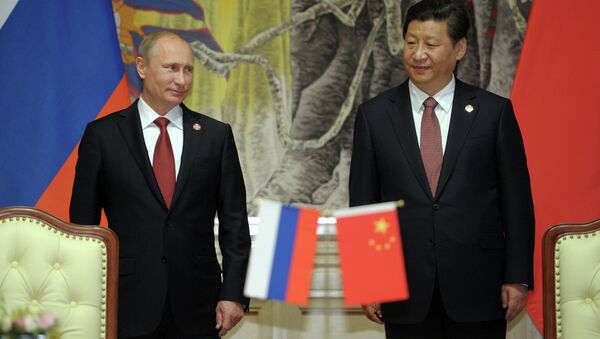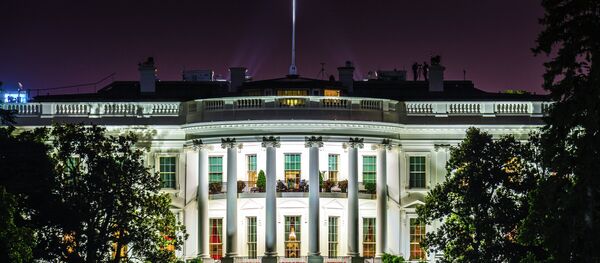Washington has kicked off a new phase of NATO's military buildup in Eastern Europe, announcing it will deploy the alliance's troops equipped with heavy offensive weaponry in the Baltic states, Romania, Bulgaria and Poland (former Soviet Republics and former members of Warsaw Pact) — near Russia's borders; the move has already been recognized as "provocative" and "dangerous" by experts in geopolitics.
"The US-NATO military buildup in Eastern Europe should be understood for what it is: military escalation on Russia's borders. While the US and its NATO allies spin the issue as merely a response to Russian aggression, the reality is that this is part of the 25 years process of NATO expansion and encroachment against Russia, a process that has done much to destabilize the post-Cold War European space. The goal has been, and continues to be, to drive a wedge between Russia and Europe; to use the Baltic states, as well as other former Soviet bloc countries as a bulwark against Russian-European economic and political cooperation," geopolitical analyst and editor of StopImperialism.com Eric Draitser told Sputnik on Monday.
"Washington is exploiting historical antipathy and antagonism of the Cold War in the former socialist countries of Eastern Europe, thereby making potential partners into enemies in order to use the ‘divide and conquer' strategy in the former Soviet space," the geopolitical analyst stressed.
According to Draitser, the arming of the Baltic states, Romania, Bulgaria and Poland must be understood as a major provocation against Russia, and yet another example of US military escalation.
"It should be remembered that the US unilaterally pulled out from the Anti-Ballistic Missile Treaty in 2002, a mostly forgotten action which has further destabilized the security architecture of Europe. The US has also continued to pursue a so-called ‘missile shield' in Eastern Europe which, far from being defensive, is clearly an offensive weapons system aimed at Russia. A number of other provocative moves call into question the US agenda in Europe. Certainly Russia has plenty of cause to doubt the sincerity of Washington's commitment to peace," he highlighted.
A Specter of a New War is Haunting the World
When asked about the possibility of a new World War, Eric Draitser put it clear: A global conflict is certainly possible, and should not be dismissed as mere fantasy or paranoid overreaction.
"In fact, history has shown a disturbing trend which almost no one in the West cares to acknowledge: the beginning of each century for the past 400 years has had some form of 'World War' in which dominant empires/powers came into conflict with disastrous consequences for millions of people," the geopolitical analyst emphasized.
On the other hand, the beginning of the 18th Century saw the War of Spanish Succession which saw the great European powers competing over the remnants of the formerly great Spanish Empire and its colonial and European possessions. As well as the beginning of the 17th Century saw the start of what would come to be known as the Thirty Years War which killed off nearly half of Europe, Draitser underscored.
"The point is that the historical trend does seem to lead towards some kind of conflict, so those interested in peace must be conscious of history as they examine the developments today," the analyst explained.
Today, with Eurasian integration proceeding at breakneck speed, there is clearly a geopolitical and historical imperative for the West (US-NATO primarily) to instigate a major war in hopes of destroying the Eurasian, multipolarity process in order to maintain and expand Western hegemony for another century, Draitser stressed.
He pointed out that such instigation has taken the form of antagonistic behavior in Ukraine, the Baltics, South China Sea, Syria, and many other places in the world.
"It remains to be seen whether they will be successful in drawing Russia, China, and the nonwestern world into such a war," the geopolitical analyst remarked.
Is there Light at the end of the Tunnel?
Such a question is difficult to answer, Eric Draitser notes, because it is predicated on the idea that the US would want to de-escalate in order to restore peace.
"In many ways, US strategy is built on destabilization, not de-escalation and, as such, there is little benefit for Washington's agenda in moving away from conflict," the geopolitical analyst stressed.
"However, assuming that the US truly wanted to restore peace and stability, it would require recognizing, first and foremost, Russia's key strategic and security concerns in Ukraine and throughout the former Soviet space. In recognizing Russia's concerns, the US would need to then work to assure Moscow that its security concerns would be taken into account. Additionally, the US would need to abandon its missile shield plans, as well as cut off all support to the fascist-oligarch government of Ukraine, both as gestures of goodwill to Russia, and as indicators of its seriousness in pursuing peace," Draitser underscored.
"At such a conference, issues ranging from the economic chaos to security situation could be discussed and resolved in mutually beneficial, mutually necessary political arrangements. The US would need to allow Europe to get back to doing business with Russia in exchange for letting Moscow have a "seat at the table" of European economic issues," Eric Draitser elaborated.
Alas, such a scenario is highly unlikely as the West seems to be hellbent on pursuing war at all costs, the analyst remarked bitterly.
"For that very reason, the Russia-China energy agreement and burgeoning political, economic, and military alliance between the two countries, becomes all the more important," Eric Draitser concluded.







